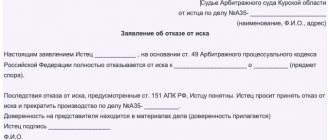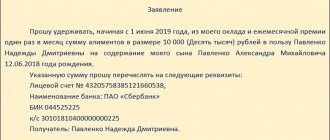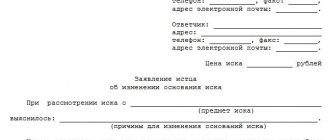Where is the writ of execution submitted?
There are several options for how a writ of execution can be presented for collection. According to the Federal Law “On Enforcement Proceedings”, you have the right to submit a writ of execution to the territorial branch of the Bailiff Service. This can be a branch located both at the place of residence (registration) of the debtor, and at the place of his stay (actual location), as well as at the location of his property.
In addition, you can bypass the appeal to the bailiffs and submit a writ of execution to the bank where the debtor’s current account is opened. To find out which bank the debtor uses, contact any tax authority with an application to provide information about the debtor’s accounts - and you will be able to receive this information after 7 days. And if your debtor is a citizen from the public sector, then you can start with Sberbank: given the share of the banking market that it occupies, the chances of writing off the debtor’s money “at random” are quite high. The bank that has received the writ of execution from the claimant is obliged to independently establish accounts and write off funds from all existing accounts within the amount specified in the writ of execution.
Finally, the writ of execution can be presented to the organization that pays the debtor-citizen periodic payments (salary, pension, scholarship). This could be the debtor’s employer company, a pension fund, an educational institution, etc. The legislation allows this method of collection if the amount of the debt does not exceed 25,000 rubles or if the writ of execution compensates for harm to health, alimony or other periodic payments are collected.
Judicial recovery: which court and within what time period should I apply?
The first important rule is not to miss the statute of limitations.
This period, as a general rule, is three years from the date on which the debt should have been repaid.
If you act in your own interests as an individual , you need to apply for the return of your funds to the courts of general jurisdiction.
If you act as an individual entrepreneur or represent a legal entity and the obligation to you arose in the course of carrying out business activities with the same entrepreneur and legal entity, such a dispute falls within the competence of arbitration courts .
How to properly fill out an application to the bailiff service?
If it is impossible to collect the debt with the help of banks, employers and other organizations, you should contact the Bailiff Service.
Enforcement proceedings are initiated by a bailiff based on an application from the claimant or his representative. The application to initiate enforcement proceedings is accompanied by the original writ of execution and the representative’s power of attorney (if he signs the application himself).
Before submitting the writ of execution, it is important to check whether the three-year period for presenting the writ of execution has expired, whether all the necessary information is indicated in the writ of execution (for the list of requirements, see Article 13 of the Federal Law “On Enforcement Proceedings”) and whether there are any errors in the writ of execution. Otherwise, the bailiff is obliged to refuse to initiate enforcement proceedings. True, it is worth noting that, for example, in recent years, judicial practice has been critical of refusals to initiate enforcement proceedings due to the lack of information about the debtor’s place of birth in the writ of execution, pointing out the insignificance of this identifying information (see Resolution of the Arbitration Court of the Ural District dated October 7, 2015 in case No. A60-19042/2015).
Particular attention should be paid to the power of attorney, that is, the powers of the representative. The text of the power of attorney must indicate the right of the authorized person to present and revoke the executive document. Otherwise, the bailiff will issue a decision to refuse to initiate enforcement proceedings and return the writ of execution. It is also worth knowing about other powers of the representative, which are specifically stipulated in the power of attorney. Such powers are:
- transfer of authority to another person (subassignment),
- appealing decisions and actions (inaction) of the bailiff,
- receiving the awarded property,
- refusal of recovery under a writ of execution,
- conclusion of a settlement agreement.
Thus, when preparing a power of attorney, you need to check whether the scope of powers specified in the power of attorney corresponds to those powers that are actually necessary when representing the interests of the claimant.
It is important to carefully work on the content of the application. The application must indicate requests for seizure of property of which you are aware:
- information about bank accounts,
- real estate (you can make requests in advance and attach an extract from the Unified State Register to the application),
- motor transport (you may have taken a copy of the vehicle registration certificate),
- information about the place of work (indicate employer details, address, telephone number),
- information from the Unified State Register of Legal Entities on the rights to the debtor’s shares in organizations,
- information about the spouse of the debtor-citizen (the spouse’s property may be arrested, and the creditor may demand the allocation of the debtor’s share through the court).
Sometimes, due to a lack of information in the application, the bailiff carries out enforcement proceedings for several months, when this could have been done much faster.
When submitting documents to the office of the bailiff department, we recommend that you immediately inquire which bailiff will receive the writ of execution, find out his office number and contact telephone number. The claimant's application and the writ of execution are transferred from the office to the bailiff within 3 days. It is important to monitor compliance with this deadline (you can call or come again). In enforcement proceedings, non-working days and holidays are not taken into account when determining the period. In practice, there are cases when, without any legal grounds, an executive document can lie in the office for more than a year.
The bailiff, within three days from the date of receipt of the enforcement document, issues a decision to initiate enforcement proceedings or to refuse to initiate enforcement proceedings. This process also cannot be ignored: if necessary, you need to remind the bailiff of the deadline established by law.
It is noteworthy that the claimant now has the opportunity to receive information about the progress of enforcement proceedings via e-mail. To do this, you must provide your email address in the application to initiate enforcement proceedings or in a separate notification. In addition, it has become possible to send electronic appeals through the personal account of a party to enforcement proceedings on the website of the Bailiff Service. Electronic interaction in this field is still being improved, but is already producing modest results, allowing for the prompt receipt and transmission of information, statements and petitions.
Information about the initiation of enforcement proceedings and the data of the bailiff who is conducting the proceedings can also be obtained from the Data Bank of Enforcement Proceedings on the Bailiff Service website. In addition, you can subscribe to changes in information on your debtor’s enforcement proceedings, which is very useful.
In addition, we recommend that you subscribe to change information about the debtor on the arbitration case filing website. If bankruptcy proceedings are initiated against the debtor, you will have two months (from the date of publication) to include your claims in the register of creditors' claims for their subsequent satisfaction from the debtor's bankruptcy estate. At the end of the procedure, the bankrupt organization will be excluded from the register of legal entities, and the bankrupt citizen may be released from paying debts.
Got a solution, what to do now?
Wait. What? How can you wait!? Yes, yes, just wait until the court decision comes into force. The fact is that, as a standard, a court decision can be appealed to the appellate instance within 1 month from the date the decision is made in full, i.e. with the motivated part of the decision. Thus, if the deadline for appeal has not yet passed, no one issues you a writ of execution.
After 1 month has passed from the date of the decision in full, if it has not been appealed and canceled/modified, it comes into force. This means that you can receive a writ of execution.
Enforcement proceedings have been initiated, what next?
After initiating enforcement proceedings, the bailiff sends electronic requests to Rosreestr, the Federal Tax Service, the State Traffic Safety Inspectorate, the Pension Fund of the Russian Federation, to banks with which electronic document management is organized, the Civil Registry Office, the State Inspectorate for Civil Information Services, Rostechnadzor, cellular operators, and the Federal Migration Service. Responses to requests, as already noted, arrive to the bailiff within a few days, and some within a few weeks.
If there is an urgent need to seize the debtor’s property, then you need to agree with the bailiff on a joint departure, if possible, providing motor transport. It is best to go to the debtor in the very first days of enforcement proceedings, that is, while he does not yet know about the initiation of a forced collection procedure. In this case, the debtor may not have time to transport liquid property to another place or “draw” documents confirming the disposal of property from his property.
During your departure, insist (or better yet, agree with the bailiff in advance) on drawing up an inventory of property, issuing a resolution to seize the property and transferring the seized property for safekeeping to you (with the exception of real estate, which cannot be transferred to the claimant for safekeeping). If property, upon seizure, is transferred for safekeeping to the debtor or members of his family, then the debtor must be warned in writing about criminal liability under Art. 312 of the Criminal Code of the Russian Federation “Illegal actions in relation to property subject to inventory or seizure or subject to confiscation.”
If the amount of debt is over 2,250,000 rubles, remind the bailiff of the need to warn the debtor about criminal liability under Art. 177 of the Criminal Code of the Russian Federation “Malicious evasion of repayment of accounts payable.” In the future, this may provide additional opportunities to encourage the debtor to repay the debt.
If the debtor interferes with the bailiff or refuses to comply with his legal requirements, then he may be brought to administrative liability under Art. 17.14 Code of Administrative Offenses of the Russian Federation. By the way, under this article, any persons and organizations that do not comply with the bailiff’s requests to provide information, transfer money, etc. can be fined.
How can a lawyer help you collect your debt?
The Bureau's lawyers are engaged in judicial debt collection in the arbitration courts of Moscow and Omsk. We specialize in arbitration disputes, have our own judicial practice and successful cases of returning money to clients through the courts.
Baldin Dmitry Aleksandrovich, lawyer, director of the Law Firm "Legal Guarantee"
How can a debtor be restricted from traveling abroad?
The bailiff has the right to restrict the debtor from traveling outside the Russian Federation for six months if:
- the debtor is notified of the initiation of enforcement proceedings,
- the basis for recovery is a judicial act,
- the 5-day period for voluntary execution of the judicial act has expired,
- the debt exceeds 30,000 rubles (and for socially important penalties - alimony, compensation for moral damage, etc. - 10,000 rubles).
If the amount of collection is from 10,000 to 30,000 rubles, then such a measure can be applied after the expiration of two months provided for the voluntary execution of a judicial act.
If, six months after the issuance of the judicial act, the debtor has still not repaid the debt, the bailiff may re-impose a ban on leaving Russia. It is important for the collector to monitor the completion of the specified periods and remind the bailiff of the need to re-issue a resolution restricting the debtor from traveling abroad.
For other articles, comments, notes on the execution of court decisions , authored by lawyers of the INTELLECT Law Firm, see the link .
How do bailiffs sell a debtor's property?
The first step is to foreclose on the debtor's funds. Until all of his bank accounts are verified, the seized property will not be put up for sale. Therefore, it is important to find out whether the debtor’s existing accounts have been verified and whether the banks’ responses are on file. If there is no money in the debtor’s bank accounts or there is not enough money, the bailiff begins the assessment and sale of the seized property.
The valuation and sale of the debtor's property is carried out by specialized organizations. The following are sold at open auction in the form of an auction:
- things more expensive than 500,000 rubles,
- real estate,
- securities,
- property rights,
- pledged property that has been foreclosed on to satisfy the claims of a claimant who is not a mortgagee,
- items of historical or artistic value.
The Federal Property Management Agency is responsible for organizing and conducting auctions. Information on the sale of property at auction is published in periodicals and on the auction website.
If the property is not sold after the first auction, the bailiff reduces its value by 15% and puts it up for auction again. If the re-auction does not take place, the bailiff offers the claimant to take back the unsold property with a reduction in value by 25% of the initial price to pay off the debt. If the claimant does not pick up the unsold property within five days after receiving the offer, it is returned to the debtor. According to the law, the sale of property is carried out within two months, but in practice this procedure takes three months to two years (this depends on the efficiency of the bailiff, appraiser, seller, as well as on the involvement of the claimant himself in the sale process).
It is impossible not to mention the simplified procedure for selling property worth less than 30,000 rubles. If such property is seized, the debtor has the right, within ten days from the date of notification of the assessment, to file a petition for its independent sale. The bailiff may give the debtor the opportunity to sell the property within ten days. After receiving the property assessment, the claimant also has ten days to file a request to retain the property. In the absence of a request for independent sale on the part of the debtor or the unsuccessful sale of property by the debtor, the bailiff offers the property to the collector to pay off the debt. If the claimant refuses to accept it, the property is transferred for forced sale in the usual manner.
Thus, the debtor is first given the right to sell property worth less than 30,000 rubles. Then the right to take the property to pay off the debt is given to the claimant. If there are several claimants who filed the petition, then the first will be the one whose demands are higher in the order established by Art. 111 Federal Law “On Enforcement Proceedings”, and if the claimants belong to the same queue - the one whose sheet was received for forced execution earlier than the other.
It is important to take into account that the debtor-citizen has executive immunity established by Art. 446 Code of Civil Procedure of the Russian Federation. Residential real estate that is the only one suitable for residence by the debtor and his family is not subject to sale.
Disputes regarding the provision of immunity to multi-meter buildings and apartments of the debtor still do not subside. The Constitutional Court of the Russian Federation recommended that the legislator develop the necessary legislative framework to overcome immunity for living space exceeding social housing standards, and several bills appeared that failed. Nevertheless, the issue is being discussed, and someday it will be settled.
There are two important aspects worth noting. Firstly, immunity implies a prohibition of sale; seizure of property is not prohibited. Therefore, when opening an inheritance within the value of the inherited property, the heirs will be responsible for the debts of the testator, and if the property is escheated, it will be inherited by the state represented by the Federal Property Management Agency or a municipal entity (if land plots or residential real estate are inherited). It is important that the seizure imposed on the debtor’s residential property is preserved and the enforcement proceedings are not erroneously completed or terminated.
Secondly, while the legislator is thinking about how to correctly foreclose on part of the debtor’s multi-meter residential premises, judicial practice has emerged that makes it possible to allocate part of the property (one or several rooms) and sell it at auction. It's quite bold, progressive, but not too common.
In compulsory execution, an important issue is whether the debtor has common property acquired during marriage. Sometimes all the property is registered in the name of the spouse, and here the bailiff has a rarely used opportunity to request information about such property and seize it until the issue of separating the debtor’s share from the common property of the spouses is resolved.
Second cassation
So, if in the first instance the case was considered by a district court, having received a decision of the presidium of the subject’s court that is not to your liking, you can appeal to the second instance of cassation - to the Judicial Collegium for Civil Cases of the Supreme Court of the Russian Federation.
To apply, it is important that you, firstly, go through the first stage of the cassation appeal and, secondly, do not exceed the six-month period for appeal. This period is calculated from the moment the appeal ruling is adopted, but it does not include the time of consideration of the case in the first cassation instance.
To appeal the decision of the magistrate, there is one more condition: in the first cassation the ruling must be made. If a determination is made, then the appeal process is over.
The received cassation appeal is first examined by the judge alone and decides whether to transfer the case to the board for consideration. The Chairman of the Supreme Court of the Russian Federation or his deputy may disagree with the refusal to transfer and cancel it.
The powers of the Judicial Collegium of the Armed Forces of the Russian Federation are the same as those of the presidium of the subject’s court.
Is it worth appealing the actions of the bailiff?
According to the law, the requirements contained in the executive document must be fulfilled by the bailiff within two months from the date of initiation of enforcement proceedings. This does not mean that the debt will be collected in two months. Also, this does not mean that the bailiff will issue a decision to end the enforcement proceedings.
The expiration of the deadlines for carrying out enforcement actions and applying compulsory enforcement measures does not entail consequences in the form of the end of enforcement proceedings. The enforcement document may remain with the bailiff for years. Therefore, appealing against the bailiff’s inaction due to a delay of two months may turn out to be futile. A higher official (senior bailiff of the department) or the court will refuse to satisfy such an application.
In practice, appealing the actions of a bailiff leads to excessive formalism in his work on your case. Therefore, it is better to have a trusting relationship with the bailiff.
We recommend complaining to the senior bailiff, the prosecutor's office or the court only when it comes to a significant violation of your rights (for example, if the bailiff commits illegal actions or if there is information and facts that the bailiff is in collusion with the debtor). We recommend that you notify the bailiff of your intention to file a complaint: perhaps the bailiff will correct the mistakes made or stop inaction, and you will not have to complain.
We are confident that the practical application of the recommendations listed in the article will increase not only the effectiveness and speed of collection, but also the likelihood of debt repayment in general.
The article was written specifically for the INTELLECT-S website
Articles of the Group of legal companies INTELLECT-S >>
bankruptcy, execution of decisions, collection services
Checking the writ of execution
The deadline has come to receive a writ of execution in court, do not rush to pick up the document and sign for its receipt, first make sure that it is drawn up correctly . In practice, court employees very often make mistakes when drawing up this document, make mistakes in dates, names, incorrectly indicate the amount, etc.
Make sure the document contains correct information regarding:
- Details of the case (number, dates, etc.);
- The writ of execution accurately reproduces the operative part of the court decision;
- The details of the parties to the dispute are correctly indicated (names, addresses, etc.)
- Worth signature and seal.
Important! Do not take away the writ of execution if it contains errors (the FSSP will refuse to execute it). Under the dictaphone recording, you will demand correction of errors and issuance of a corrected document.








